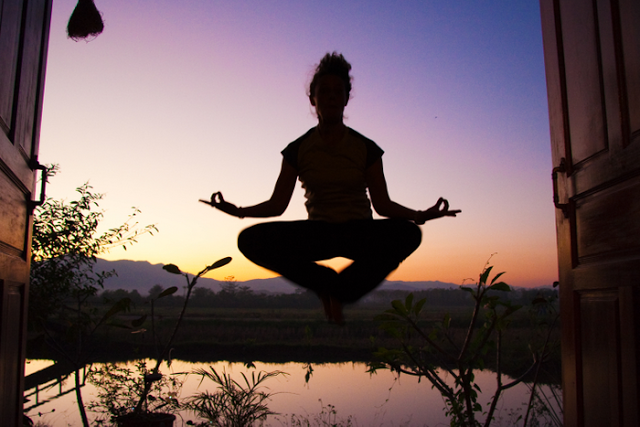I have only been a yoga practitioner for a short period of time, but already, its benefits are seeping into my everyday life.
I have been able to get my drinking under control, my stress levels have significantly decreased, my energy is up and my overall well-being is so much more positive. Through this and through spiritual searching involving meditation, online Buddhist workshops and readings that have encouraged me to look inside myself, I’ve come to the conclusion that I am a hypocrite. This is not meant to be self-deprecating or self-judging—it is merely self-awareness.
Why am I a hypocrite?
I always say people move way too fast—they either talk without thinking or they jump into relationships without consideration or they act in some other similar mindless manner that irritates me.
Yet here I am, caught red-handed by my own hypocrisy. I move too fast.
My yoga practice and my recent spiritual journey have urged me to delve into my past and into my behaviors to dissect my patterns. With this, I have been thinking a lot about a life-changing experience I had roughly a year ago.
I got my heart broken for the first time because I jumped into something (still not sure what it was) with someone who also dove in with me. Neither of us was thinking ahead—we acted impulsively because it felt good in the moment. Both parties were guilty and I have since owned up to my role. Regardless, I was devastated when it inevitably unraveled (to put it gently)— though they do say, “What starts in chaos, ends in chaos.”
I moved too quickly and too senselessly, and I got burned. Now with this recent change in my life—taking up a yoga practice—I realize it’s happening all over again.
When I started yoga, I was immediately going to the studio five days a week, like the raging lunatic I am.
Why? Because when I commit to something, I commit fully. My loyalty and dedication to whatever I am doing are unwavering. Clearly, this is kind of a reckless habit when not applied mindfully.
After about two months of practice, I injured my shoulder from attempting poses for which I was not ready.
Crow pose? I got this. Tripod headstand? You bet. In the end, I stretched myself past my limits and paid the price by not being able to practice for two weeks. Then once I was healed, I did it again.
As I was lying in bed after an intense level three class—after which I came home to continue practicing inversions—my body was calling out to me. No, not calling—screaming.
It said, “Girl, you need to slow down.”
This led me to lying in pain, with an ice pack on my shoulder and a notebook and pen in hand, asking myself several questions, and these are questions anyone can ask themselves when they feel like they are enduring this same self-mutilation and when they feel they need to re-evaluate a situation.
1. What am I trying to prove, and to whom?
Yoga (and life’s journey in general) is not about proving anything or being better than someone else.
For me, it is about finding my own meaning and my own strength. Maybe I fall over in crow pose one day, and the next I’m able to balance for three seconds (or maybe not).
Out in the real world, perhaps we have trouble opening up to someone, but after knowing them for a while, we tell them something about ourselves we wouldn’t normally tell anyone. No, we don’t want to move in with them tomorrow, but it’s all progress.
It is not a contest, and if we feel we have to prove ourselves to something or to someone, it’s probably time to re-assess our needs and desires.
2. What am I getting out of this?
Once I ripped my shoulder apart from attempting a forearm balance without actually having the strength to do it, I realized what I was getting out of it—nothing.
Well, I was getting incredible amounts of pain and ridiculous applications of IcyHot several times a day, but aside from that, nothing truly empowering or positive was coming out of this stubborn and useless determination of mine. The same can be true for a relationship or a job that just isn’t cutting it for us. If it is causing more harm or needing more effort than it is causing constructive or progressive motion, perhaps letting go or scaling back is a better option.
Like I saw in a recently shared Facebook photo via the awesome Vinyasa warrior Sadie Nardini, “If it doesn’t nourish your soul, get rid of it.”
3. Why did I enter this practice/situation in the first place?
I came to yoga and to spirituality to help with managing my emotions, to overcome heartbreak and disappointment and to harness self-compassion and awareness. I did not, however, enter the practice to build intense muscle mass or to be able to balance on my pinky toe. The newly-embarked journey was for bettering my soul, and once I realized I was not doing that by hurting myself, I was reminded of this initial desire.
Maybe it takes an injury or a stark setback in our lives to prompt us to remember our values or our goals. It is up to us to utilize those moments to create positive change and to help us stay on our path. We can’t prevent those disappointments from happening, but we can choose how we see them and what we do with them.
Along these same lines, I recently stumbled upon the quote from the novel The Noticer by Andy Andrews and it reads, “There is no growth at the top of the mountain.”
Many other thinkers and writers have similar quotes to this, and for good reason—it’s true. Everything is process, no matter how small our steps may seem to us. But often, we get caught up in the destination to the point where we ignore the journey, wishing to bypass it and take the easier route. However, that route is not always so easy and, in fact, can usually create huge roadblocks that hinder our progress.
We have to accept where we are at the moment, and I’m slowly realizing that. I will never have anything to work on or towards if I try to do everything at once. There is no lesson in that. There is no growth. There is no awareness. Sometimes we have to remind ourselves that yoga teaches us to embrace that kind of acceptance, and to go against that is not honoring its magnificent truth and gift.
Remember—everything is process. Everything is progress. Everything is growth. Let’s consent to that and be grateful for it all.
Love elephant and want to go steady?
Sign up for our (curated) daily and weekly newsletters!
Apprentice Editor: Kristin Monk / Editor: Catherine Monkman
Photos: Wikicommons, Kishnani/Pixoto












Read 0 comments and reply